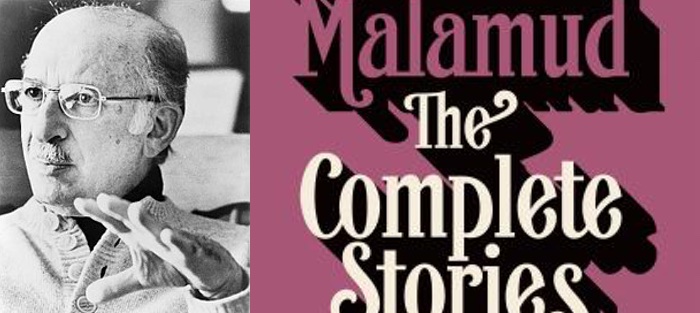The stories that stick with me are often the ones I can’t understand. “My Son the Murderer,” by Bernard Malamud, is one such unforgettable baffler. It’s not the content that confuses. The story is straightforward enough: a father and son are unable to understand each other, a classic conflict heightened by the tumultuous times they live in. The son, Harry, has just graduated college and is waiting for notice from the draft board. Notice he receives midway through the story, discovering he’s just been drafted to go fight a war in Vietnam that no one understands. This lack of comprehension ties the story together. Harry can’t understand his father Leo. Leo fails to understand his son. Neither understands the mad world they inhabit.
 While the content is engaging, it’s the way Malamud plays with the form to make the reader feel this incomprehension that makes the story unique. Malamud shifts back and forth throughout the story into multiple points of view. One moment we have a close-third person form of narration, as in the first sentence focusing on the son: “he wakes feeling his father in in the hallway, listening.” While the next sentence seems to subtly shift to focus on the father: “He listens to him sleep and dream. Listening to him get up and fumble for his pants…to his anguish, loneliness.” And the following sentences zoom out, ostensibly told by an omniscient narrator: “The father stands in the hall. The son hears him listen.” Yet another shift in the very next sentence: “My son the stranger, he won’t tell me anything.” Not only have we shifted POV, we’ve also shifted narrative distance. We’re now in the father’s head, on the other side of the door. And the next sentence Malamud does it again: “I open the door and see my father in the hall. Why are you standing there, why don’t you go to work?” We’re with the son again, but first-person now, addressing his father. Throughout the story Malamud shifts POV, back and forth, father to son, close-third to first person, weaving the tension between them, their mutual misunderstanding, into the very form of the story.
While the content is engaging, it’s the way Malamud plays with the form to make the reader feel this incomprehension that makes the story unique. Malamud shifts back and forth throughout the story into multiple points of view. One moment we have a close-third person form of narration, as in the first sentence focusing on the son: “he wakes feeling his father in in the hallway, listening.” While the next sentence seems to subtly shift to focus on the father: “He listens to him sleep and dream. Listening to him get up and fumble for his pants…to his anguish, loneliness.” And the following sentences zoom out, ostensibly told by an omniscient narrator: “The father stands in the hall. The son hears him listen.” Yet another shift in the very next sentence: “My son the stranger, he won’t tell me anything.” Not only have we shifted POV, we’ve also shifted narrative distance. We’re now in the father’s head, on the other side of the door. And the next sentence Malamud does it again: “I open the door and see my father in the hall. Why are you standing there, why don’t you go to work?” We’re with the son again, but first-person now, addressing his father. Throughout the story Malamud shifts POV, back and forth, father to son, close-third to first person, weaving the tension between them, their mutual misunderstanding, into the very form of the story.
Arguing in the kitchen, his mother advises the son to get some work, something temporary, as a cure to his moping. The son starts to yell, “everything is temporary. Why should I add more to what’s temporary? My gut feels temporary. The goddam world is temporary. On top of that I don’t want temporary work. I want the opposite of temporary, but where is it? Where do you find it?” This is what the son says, but filtered through his father, recounted by his father. However, the very next sentence is the son’s: “My father listens in the kitchen.” And the next, refusing to let us dawdle in one POV, is the father’s: “My temporary son.”
The story baffles because it breaks all the rules, shifting POV multiple times in a story that’s under seven pages. Multiple times in the opening lines. Adding to the confusion, Malamud doesn’t use quotation marks, further blurring the lines between father, son and narrator. And yet, it works. Not only does it work, it’s essential to the story. The form is the story.
The story moves from one mishap after another as the father tries to understand his son, looking for clues where he can. Eavesdropping outside his room. Opening his mail. Following him out into the street, even hopping on a trolley and tailing him to Coney Island, the setting of the final evocative scene. It is February, a cold and desolate Coney Island. Leo walks along the boardwalk looking for his son, and Malamud lets the setting do some heavy emotional lifting, “The gray sunless beaches were empty…The gunmetal ocean, moving like melted lead, looked freezing. A wind blew in off the water and worked its way into his clothes so that he shivered as he walked. The wind white-capped the leaden waves and the slow surf broke on the empty beaches with a quiet roar.” All that built up imagery, martial, gun-evoking, heavy. “On his way to Brighton Beach he saw a man on the shore standing in the foaming surf…the man on the roaring shore was Harry, standing in the water to the tops of his shoes.” His son is on the edge of something, a cold and roaring sea, and his father almost doesn’t recognize him. No longer his son but a man, a stranger. And yet, Leo can’t help but love him:
Leo ran to his son. Harry, it was a mistake, excuse me, I’m sorry I opened your letter.
Harry did not move. He stood in the water, his eyes on the swelling leaden waves.
Harry, I’m frightened. Tell me what’s the matter. My son, have mercy on me.
I’m frightened of the world, Harry thought. It fills me with fright.
He said nothing.
The son’s tragedy isn’t just a piece of paper from the draft board. It’s in naming his suffering to himself while still being incapable of articulating it to his father. In feeling he has no one who’ll understand, though they’re both united in fear. All while the cold sea seeps into his shoes and the army waits for fresh meat to feed an unconscionable war.
Next, Malamud externalizes the different approaches to life, the father’s and the son’s, in the father’s hat lifted off by the wind: “It looked as though it was going to be blown into the surf, but then the wind blew it toward the boardwalk, rolling like a wheel along the wet sand. Leo chased after his hat,” just as he chases after his son, trying to protect him from the leaden sea. Is this observed by Harry or the narrator? Before we can decide, Leo has the mic again: “He is a lonely man. This is the type he is. He will always be lonely. My son who made himself into a lonely man.” And then, this nugget of wisdom comes to the surface of Leo’s mind, but, like his son, it is thought but unsaid:
Harry, what can I say to you? All I can say to you is who says life is easy? Since when? It wasn’t for me and it isn’t for you. It’s life, that’s the way it is—what more can I say? But if a person don’t want to live what can he do if he’s dead? Nothing is nothing, it’s better to live.
Come home, Harry, he said. It’s cold here. You’ll catch cold with your feet in the water.
Harry stood motionless in the water and after a while his father left. As he was leaving, the wind plucked his hat off his head and sent it rolling along the shore. He watched it go.
Is it Harry or Leo who watches the hat go? If Leo, the change is heartbreaking. The father’s resignation as the wind takes his hat whereas before there had been resolve. Then, more shifts as Malamud brings the story to a close:
My father listens in the hallway. He follows me in the street. We meet at the edge of the water.
He runs after his hat.
My son stands with his feet in the ocean.
But there Leo is again, running after his hat despite it all. And his son, hollowed out with fear, is still only at the edge of it. Reading it, I can almost hear the wind blowing, feel the water freezing my toes. But Malamud left us a lifeline in Leo’s comic persistence not matter how hard the wind may blow. Maybe this is what makes the story work, what allows for the swift shifts in POV. Malamud knows the reader will tie the two together because who hasn’t stood, terrified, on the edge of something? And who hasn’t tried to walk someone back from a similar position? What could be more human than crippling fear and the insane courage one must have to face it? The resolve in chasing a hat, a person, that will inevitable be swallowed by the sea? God, I love Leo for that. Like Camus’s Sisyphus smiling at the top of his hill, Leo will chase that hat forever because he’s right even if Harry, deaf with fear, can’t hear him.






